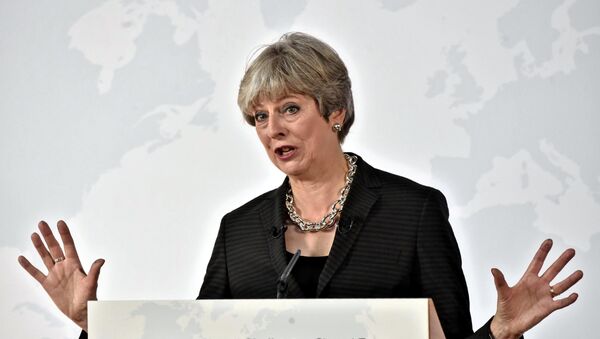In a speech in Florence last week, UK Prime Minister Theresa May set out a vision for the country's future after Brexit. She suggested implementing a two-year transition period after leaving the EU, during which London would retain its current trade terms and financial commitments to the EU budget.
A "significant clarification" of the British government's position, May's proposal shifts the UK's stance toward that of the EU negotiators and increases the chances of reaching a deal, Dr. Tom Mullen, Professor of Law at the University of Glasgow, told Radio Sputnik.
"The proposal she has made is definitely closer to the soft Brexit camp because it means that even although technically we will leave the EU at the end of March 2019, there will be a further two years in which we will, for most purposes, act as if we were members because we will continue to be bound by EU law, by single market rules, by the customs union rules and so forth," Mullen said.
When they voted for Brexit, many voters in the country as a whole and among Conservative Party members expected an immediate exit from the EU. However, not all of them understood that by ceasing to be a member the country would also cease being bound by single market and customs union rules.
Some pro-Brexit observers see May's proposal as a step along the road to Brexit, which fleshes out terms for the withdrawal. However, Mullen said it might have the effect of casting ambiguity on the whole Brexit process.
"The effect, of course, might be to cast some doubt on whether Britain leaves in the long term, because it allows more time for a change of heart politically, by the people perhaps, [or] even a change of government," Mullen said.
An extension to the period of Brexit transition "is necessary in order to disentangle Britain and the EU."
"There is no way that we could effectively abandon the single market and the customs union at the end of March 2019 without causing tremendous disruption to trade and human relationships."
The EU's chief negotiator Michel Barnier said that May's speech was "constructive" but "must be translated into negotiating positions to make meaningful progress."
Constructive #FlorenceSpeech by PM May; must be translated into negotiating positions to make meaningful progress https://t.co/fCfBrqNhAp
— Michel Barnier (@MichelBarnier) 22 сентября 2017 г.
Brussels is likely to welcome the UK's offer of a transitional period, in particular the offer to keep paying into the EU budget until the end of the current cycle, in 2020.
"There are still long-term concerns about the budget that the EU will have. I think the EU will also be slightly concerned that the British government does not yet seem to have clarified its views on the long-term relationship."
"This transitional period will expire in March 2021, the Prime Minister's speech was not very clear on what will happen after that. She did say she doesn't want the Norway or the Canada model, but there is no clarity on what, other than those two models, the UK would wish to negotiate," Mullen said.
Norway is bound by single market rules, but it doesn't have input into the EU's lawmaking process. A similar status for the UK would probably be unacceptable to both sides of the Brexit divide, those who wanted to remain in the EU and those who wanted to leave.
"At the moment, that's not on the agenda because it's certainly not favored by a large section of the Conservative Party and indeed significant sections of other parties. It could certainly be argued that it's not all that compatible with the sentiments behind the original popular vote to leave Europe. It's not a great deal different from the existing position."






